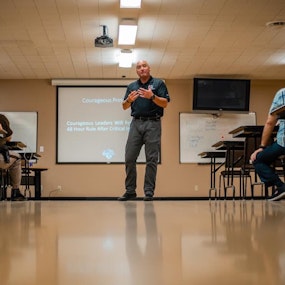When we consider the reform of policing practices, particularly under the guidance of the Department of Justice (DOJ) consent decrees, the conversation often leans towards the positive changes anticipated. However, what is frequently overlooked are the intricate challenges and unforeseen repercussions that such changes can have on a police force and the community it serves. This episode of our podcast, featuring Sean Willoughby, president of the Albuquerque Police Officers Association, casts a revealing light on this complex subject, particularly as it has unfolded in Albuquerque, New Mexico.
The city of Albuquerque has been under the microscope of DOJ oversight following a rise in officer-involved shootings. The introduction of reforms intended to improve the police force's interaction with the public, especially in the context of mental health and de-escalation, have led to a surprising paradox: an increase in fatal encounters rather than the reduction that was aimed for. This situation has forced a reevaluation of not only the policies themselves but also the methodology and training accompanying them.
LISTEN TO THE PODCAST HERE
Willoughby's insights underscore a stark reality—officers are grappling with a widening gap between the theoretical framework of these reforms and the practical application on the streets. The DOJ decrees have placed immense pressure on the police force to comply with mandates that, while well-intentioned, often seem disconnected from the daily realities of law enforcement work. The implications of these changes are profound, affecting not just the officers but also their ability to effectively serve their communities.
Financial strain is another critical issue that emerges from the implementation of these DOJ mandates. Albuquerque's struggle highlights how local governments are often forced to allocate significant resources to fund investigations into their own police forces. This not only strains the budget but also raises questions about the autonomy of local law enforcement and the potential conflict of interest that arises from being financially beholden to the same entity that oversees them.
The challenges do not end there. The culture within the police department undergoes a transformation as officers adjust to the new norms. This cultural shift has ramifications for the recruitment and retention of officers, the morale within the force, and the overall efficacy of policing. Furthermore, the extended duration of DOJ oversight can lead to entrenched policies that may not align with the evolving needs of the community or the principles of effective policing.
One of the most significant consequences of DOJ oversight is the psychological impact on police officers, particularly new recruits. The intense scrutiny and the potential for disciplinary action for any perceived misstep can lead to an atmosphere of fear and hesitation. This can undermine the confidence and decision-making abilities of officers, potentially jeopardizing public safety and the officers' own safety.
In closing, the podcast episode does not merely critique the DOJ's approach to police reform; it also pays tribute to the resilience and adaptability of law enforcement officers who continue to serve despite the challenges posed by these changes. It emphasizes the importance of leadership that can bridge the gap between policy and practical application, ensuring that reforms truly serve the purpose of enhancing public safety while respecting the rights and dignity of all involved.
In a world where the thin blue line is increasingly scrutinized, the case of Albuquerque serves as a cautionary tale. It is a call to action for more nuanced, informed, and empathetic approaches to police reform—one that considers not just the intended outcomes but also the real-world implications for those tasked with upholding the law.







